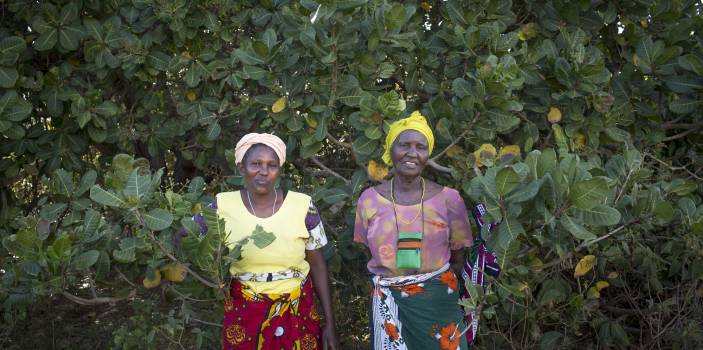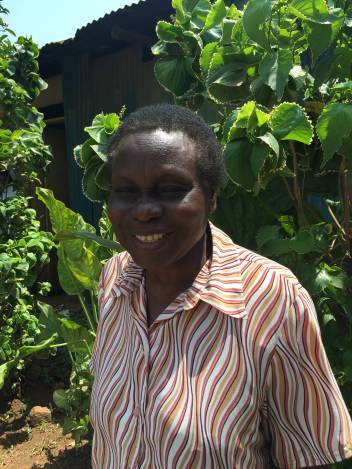
On International Women’s Day, we hear from activist Margaret Itola Kabango about women’s empowerment in Uganda. Margaret has been an Age Demands Action (ADA) campaigner for seven years, sits on the ADA steering group and before that she was a department head in the Ministry of Health.
My name is Margaret. I am 72 years old and live on the outskirts of Uganda’s capital Kampala. For many years I have advocated for the rights of older people as a leader in my community, but to get here I have had to overcome the various barriers women like me face in society.
As an older woman, people presume that I am not knowledgeable enough, that the ideas I put forward are not worthy of attention or should be taken seriously. This ageism extends to policy – our decision-makers do not prioritise our needs. We are last on the list. In their eyes we are spent, we have had our share and should step aside for younger generations.
But this only reinforces negative attitudes towards older people when it should not be a competition between generations. Older women like me and girls growing up now in Uganda both face challenges. We can work together for the betterment of all women and girls. With the support of younger generations, it is older female leaders like me who can advocate for greater equality and empower the girls of today.
The importance of education for girls
 There is an expectation on girls in Uganda. Their life course is set out clearly ahead of them at a young age: you will get married in your teens, become a house wife and bring up your children. For many women, to stray from the path and break out of the shackles fastened by their gender takes opportunity, encouragement and hard work.
There is an expectation on girls in Uganda. Their life course is set out clearly ahead of them at a young age: you will get married in your teens, become a house wife and bring up your children. For many women, to stray from the path and break out of the shackles fastened by their gender takes opportunity, encouragement and hard work.
Education is key. Gender equality will remain elusive unless girls get schooling to develop leadership skills and the expertise needed to get ahead in life.
More than half (61%) of girls who go to school in Uganda drop out. Meanwhile, 57% have reported being absent due to their menstrual period and missing on average 11% of school time, according to a study of 140 schools by SNV and IRC. A lack of washrooms, no access to sanitary pads and bullying from their peers discourage them from attending, and the schooling they miss out is very difficult to make up.
We need to promote education. We need to put in place projects that enable girls to overcome barriers like these so they can attend school and strengthen their learning.
Women have the potential to measure up to and exceed their male counterparts, and there is no doubt that a woman could one day soon be the leader here in Uganda. Indeed, our country is making significant progress in terms of women’s political representation. At present, 35 women are in parliament, and the important role of speaker is held by Rebecca Kadaga.
If a girl says she wants to be president, no one should doubt her. I am inspired by and look up to current President of Liberia Ellen Johnson Sirleaf and India’s third Prime Minister Indira Gandhi with great admiration.
Learning for older women
For older women, life-long learning should be encouraged to build their confidence and capacities. Joining up with other women in older people’s associations provides the opportunity to share ideas and expertise, to help people claim their rights and to boost income through group saving schemes and money-generating projects.
You can look to your family too – I make the most of my tech-savvy children and grandchildren to help me get to grips with the ever-changing world of the internet. This support is invaluable and provides a great platform for intergenerational dialogue.
Older women must not neglect the supporting role they have to play with younger generations too. They must encourage the girls under their care to go to school and take education seriously.
African Union and women’s rights
The African Union has made 2016 the Year of Human Rights, with a special focus on women. This is something I very much welcome, as there is much that African governments can do to protect the rights of older women.
Countless women across Africa are victim to domestic abuse – violence that becomes normality in the lives of both young and old. The 2006 Uganda Demographic and Health Survey found that two-thirds of women experience abuse from their partners, and the lesser educated population is more likely to fall victim. Likewise, we need to be able to claim our property rights and entitlement to decent shelter – women’s lack of economic empowerment can leave them marginalised when it comes to land ownership.
These women need protection. They need access to pensions to alleviate their poverty, and they need the availability of health services catered to their specific requirements.
Persistence leads to positive outcomes
So long as I am functionally able, I will never stop campaigning for gender equality. I cannot lapse in my efforts while there is work yet to be done, while equality remains uncertain for generations now and in the future.
Join Margaret and become an Age Demands Action campaigner.
